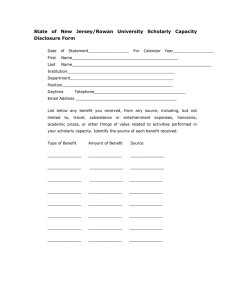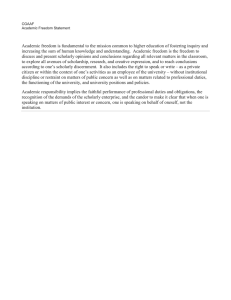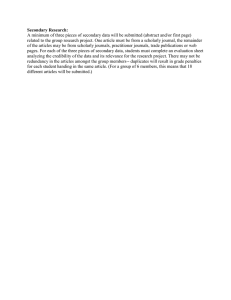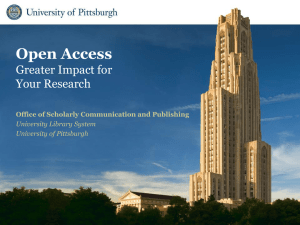Open Access and the new Copyright Policy: Greater impact for your research
advertisement
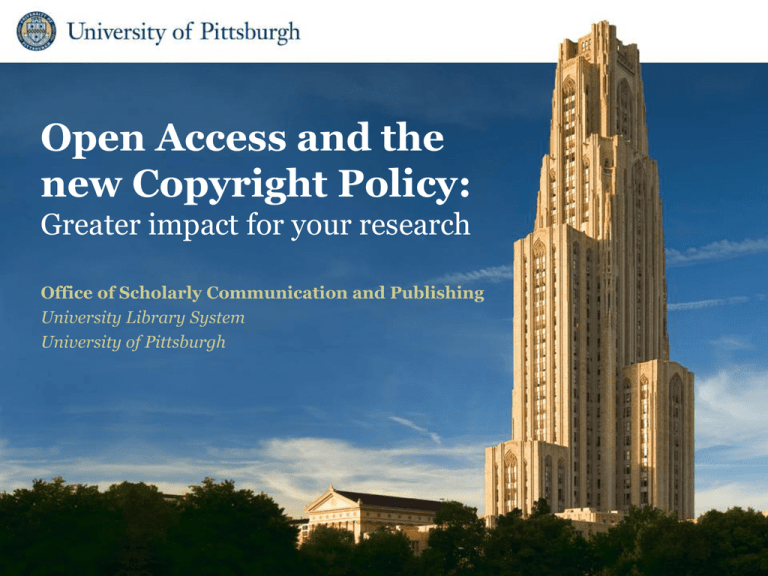
Open Access and the new Copyright Policy: Greater impact for your research Office of Scholarly Communication and Publishing University Library System University of Pittsburgh Open Access is… • A family of copyright licensing policies under which authors and copyright owners make their works publicly available • A movement in higher education to increase access to scholarly research and communication, not limiting it solely to subscribers or purchasers of works • A response to the current crisis in scholarly communication OA is compatible with . . . • Copyright • Quality • Peer review • Career advancement • Revenue (even profit) • Indexing • Print • And other features and supportive services associated with scholarly literature • Preservation • Prestige Growth in scholarly publishing • Est. 50 million scholarly research articles published 1665-2009 • @1.4 million articles per year (2006 est.)—one every 22 seconds! • Average number of science articles per journal increased by >47% from 1990 to 2009 (Times Higher Education, 8 July 2010) • Number of scientific articles indexed by ISI was 590,841 in 1990 and 1,015,637 in 2009 – a rise of 72% 1990-2009 Concentration of ownership • Nearly 50% of the content of the merged ISI Indexes consists of titles from 5 major publishers— – – – – – Elsevier Wiley Springer Taylor & Francis Sage • Top 3 publishers of science journals (Elsevier, SpringerKluwer, Wiley-Blackwell) accounted for @ 42% of articles published (2002) • There were over 2,000 publishers of academic journals; no other publisher accounted for >3% of market share (2002) Crisis in scholarly journal pricing 600 biology 500 chemistry engineering & tech general science 300 math & comp sci physics 200 CPI (general inflation) ARL expenditures, all serials 1985 1990 100 1995 2000 year Bill Hooker, April 2009. Data sources: Library Journal Annual Serials Price Surveys, Association of Research Libraries, US Dept. of Labor 2005 0 2010 % change since 1990 400 Open Access—Origins • Crisis in scholarly communication/publishing – Flat to declining collections budgets – More demand for newer, expensive resources – Greatly increased pricing for serials, electronic resources • Rise of Internet and Worldwide Web – Rapid dissemination of new research – Better connectivity between scholars OA Today • Over 150 universities around the world mandate Open Access deposits of faculty works • Directory of Open Access Journals (DOAJ) – lists 7,530 OA journals in 117 countries – http://www.doaj.org (February 2012) • Directory of Open Access Repositories (OpenDOAR) – lists 2,173 open archives in 99 countries – http://www.opendoar.org (February 2012) OA@Pitt—Today • 28 Open Access journals now published with more pending; nearly all are peer-reviewed • ULS Publications Advisory Board formed • Archive of European Integration contains 16,900 items • 5 author self-archiving repositories with more planned • D-Scholarship contains more than 7,200 items • Over 750 OA book titles through Press Digital Editions • Over 4,400 ETDs • Proposed Open Access mandate Open Access Task Force • Charge: – To review issues related to open access and to make recommendations to the University related to the adoption of an open access policy at Pitt Open Access Task Force • Rush Miller, University Library System (Task Force Chair) • Michael Madison, School of Law • Cynthia Miller, University of Pittsburgh Press • Steven Reis, Associate Vice Chancellor for Clinical Research, School of Medicine • Adam Shear, Dept. of Religious Studies • Karen Shephard, Barco Law Library Proposed OA Policy @Pitt • Is addressed in the Copyright Policy • Provides for dissemination of scholarly works (articles only) by university authors based on Open Access principles • University authors include faculty, postdoctoral associates, and postdoctoral students • Scholarly works to be deposited in the University’s institutional repository, D-Scholarship@Pitt • Deposits made by the University Library System’s Office of Scholarly Communication and Publishing Proposed OA Policy @Pitt • Not intended to impose limitations on where university authors can publish, now or in the future • Applies only to scholarly works for which the author retains copyright or the publisher allows deposit in local repository • Depending on publisher policy, authors may deposit: – author’s pre-publication manuscript – final edited copy (pre-print) – final published version (post-print) • Includes provisions to waive deposit requirement if permission is not granted by the publisher OA and “U”: Why Open Access? • Increase the visibility and discovery of the research output of the University of Pittsburgh and its faculty • Support the University’s mission of service by disseminating research results to the global academic community • Readily demonstrate the high level of research conducted at the University to international ratings agencies and colleagues OA and *You* • Greater access – More scholars view and read work – Extends the global reach of research – Reduces or eliminates price/permission barriers of subscription journals • More progress – Promotes speed, productivity, and knowledge translation – Allows authors to share research for the public good, not only with colleagues at the University of Pittsburgh but around the world • Long-term preservation in a trusted repository • Greater impact OA and Its Impact • Get your work noticed, used, and cited • Make your work available while ideas are fresh and new • Share your work with colleagues and students • Publish other scholarly works (books, articles) • Index in Google Scholar, OAIster, and other Internet search tools D-Scholarship@Pitt • The University’s institutional repository • Authorized users: University of Pittsburgh faculty, staff, and students • Individuals with a current University of Pittsburgh computer account (either primary or sponsored account) D-Scholarship@Pitt • Content is reviewed for appropriateness to repository policies but is not peerreviewed by the University • Peer-reviewed content may be deposited per copyright and publishers’ guidelines D-Scholarship: Research accepted • • • • • • • • • Research papers, published or unpublished Articles (pre-prints, post-prints) Books, chapters, sections Conference/workshop papers/presentations Monographs, reports Multimedia (audio, video, images) Compositions, performances, exhibitions Research data Electronic theses and dissertations D-Scholarship: Not Accepted • • • • Learning or instructional objects Class notes, syllabi, sample tests, etc. Student portfolios Institutional records D-Scholarship: Discoverability • Indexed by – Google Scholar, Google, Internet search engines – OpenDOAR: The Directory of Open Access Repositories – OCLC WorldCat – Open Archives Initiative harvesters (OAIster, Pennsylvania Digital Library, et al.) – PittCat+ Sherpa RoMEO • Searchable database of publisher's policies on self- archiving of journal articles on the Web and in OA repositories • Helps clarify whether authors can self-archive and under what circumstances • Developed at University of Nottingham, UK – http://www.sherpa.ac.uk/romeo/ What we can do for you • We can do the work for you • Deposit your published works in DScholarship • Automate the process when possible • Help with understanding publisher policies • Join with other universities to leverage the Policy with publishers Visit our Web sites • OA at Pitt – Visit http://openaccess.pitt.edu • D-Scholarship@Pitt – http://d-scholarship.pitt.edu Contact us ULS Office of Scholarly Communication and Publishing • Tim Deliyannides, Director • John Barnett, Scholarly Communications Librarian • Vanessa Gabler, Electronic Publications Associate oscp@mail.pitt.edu
